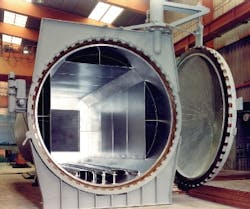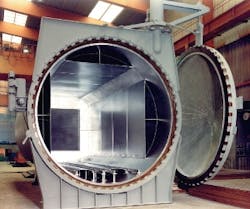System provides chemical-free limescale protection
[Case Study, July 2009] - The Saipa Shishe Company, located in Qazvin, Iran, produce specialist glass such as laminated and tempered automotive glass, safety glass, and bulletproof glass. In production, the Saipa Shishe Company relies on an autoclave, a machine that uses the three-stage process of heating, holding and cooling to laminate glass. During production, the autoclave is loaded with the glass, and the internal temperature increased to 150°C and a pressure of 180psi for approximately 60 minutes. The heaters are then turned off, and cooling water is pumped through the coils in order to decrease the temperature to 50°C whilst the glass is still under full pressure. It is important the glass is not de-pressurized earlier. When the temperature reaches 50°C and the pressure is almost equal to the atmosphere's pressure, the door is opened and the finished product removed.
However, due to the hardness of the water at the Saipa Shishe Company, limescale build up was a major problem, and the coils of the autoclave needed to be manually descaled every two months with the use of strong chemicals. This process was both time consuming and expensive, with each 'clean' meaning the autoclave was out of service for two days. The use of acid also caused damage to the heating elements of the system, reducing its life to only three or four washes.
Hydropath's AquaKlear P-100 prevents the build up of all limescale deposits, including calcium carbonate, by emitting randomly varying electric fields throughout the system. The result is the production of nuclei throughout the water system. When the water is heated, the resulting precipitate that usually deposits on hot surfaces grows in suspension and develops as a crystal on the nuclei, which is then washed away in the flow. The fields treat the water both up and down stream and will be transmitted into the plumbing system to treat the primary water. The treated water is normally able to dissolve existing scale in just a few months.
The AquaKlear P range can be used in a variety of commercial and domestic applications such as swimming pools and spas for pipe sizes up to 200 mm.
July 2009
###

